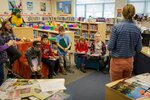

Career options were a topic of discussion for all local elementary students recently, thanks to a week of speakers and a family career night.
“We had 23 community members, including parents, come in and speak with our students at Alpine Lakes; some also spoke at PD.” said Meche Grace, counselor at Alpine Lakes Elementary (ALP). “It was so fun hearing about their different jobs, what was challenging and fun for them, and the non-linear journey each took to figure out what type of work fit them best.”
One speaker, Kevin Farrell, spoke to four classes of third and fourth graders about his job as an electrical engineer for Motorola Solutions. He builds and optimizes radio networks for emergency services like police and fire. Because a network is a complex concept, he started his PowerPoint presentation with images of handheld radios and one in a police car. He then showed a photo of a tower on a mountain, where he plans the antenna placement so that police can talk to each other on either side of the mountain.
He couldn’t go deep into details given the time frame, but the students were intrigued, and many hands shot up to ask questions. When one child asked about the biggest challenge of his work, Farrell turned the question around, saying that challenge was one of the most rewarding parts of his job, keeping it interesting and leading to satisfaction when he helps find a solution. The students also learned that an engineer doesn’t work alone but is actually part of a team of people, from development and planning to installation and testing.
“It was fun, especially when students walked up to me afterward and said they liked my job the most,” Farrell said. “I know there are a few students who would seek jobs in the sciences, and maybe this would help them strongly consider engineering as a career in the future.”
Students practiced active listening and jotted down notes during the presentation. A couple students’ takeaways included how Farrell “solves design problems,” “helps police and firemen” and “uses math and science” in his work.
The speakers, through sharing their day-to-day work as well as their passion, allowed students to see career paths, whether PT, entrepreneur, journalist, or rocket scientist, as, more possible for themselves.
“Hearing from students and teachers about the impact that the lessons and community career speakers had is really validating,” said Grace. “Teachers have told me anecdotes of students talking amongst themselves about which speaker had the job they’d want, how cool it was seeing the inside of the EMS rig or watching a NASA launch video, and talking about the ‘problem they want to solve’ in the future instead of the older iteration of, ‘what do you want to be?’”
In addition to the classroom speakers, Grace and her counseling colleague at PD, Jennifer Schmidt, organized a family career night. When families arrived at PD, the student could fill out a short survey to start to voice what could be their dream job and to connect it to what they’re learning in school. Then they were set loose to explore stations arranged by six career clusters: technical, medical, human resource, communication, business or agriculture-based jobs.
At each station there was an activity, run by high school volunteers, such as planting seeds, building with Legos, drawing or writing on a journal page or doing some money math problems.
“Jennifer and I had fun interacting with our students and their families while they learned about jobs in different career clusters in Spanish and English,” explained Grace. “The families were able to eat a taco bar dinner provided by CSD Food Services [and paid for with a grant]. The Wenatchee Valley Community College CAMP program came to explain their programs and both the NCW Libraries and Alpine-PD PTO were represented too!”
“These efforts fit right into our district-wide AVID program,” said ALP principal Kenny Renner-Singer. “One of the key pieces of AVID is creating a future focused, career and college readiness culture throughout the district. Having students link current learning to future goals helps them to see a path forward, beyond high school.
“The counselors did an amazing job of organizing the speakers and the career/college night. Without their work, these opportunities for student would not have happened.”
Grace added, “The earlier we have conversations with kids about the future—goal-setting, workplace expectations, connecting what they are learning in class with their life after high school—the better.”
Comments
No comments on this item Please log in to comment by clicking here